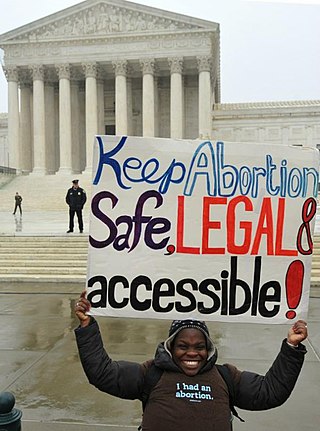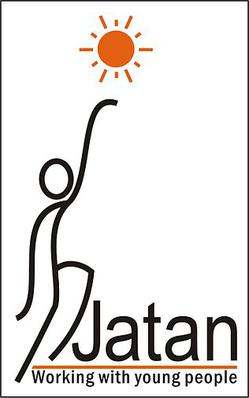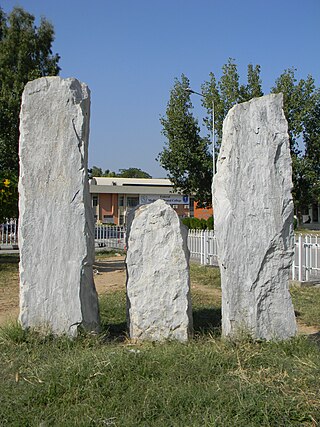Related Research Articles

Family planning is the consideration of the number of children a person wishes to have, including the choice to have no children, and the age at which they wish to have them. Things that may play a role on family planning decisions include marital situation, career or work considerations, financial situations. If sexually active, family planning may involve the use of contraception and other techniques to control the timing of reproduction.
Women's health differs from that of men's health in many unique ways. Women's health is an example of population health, where health is defined by the World Health Organisation as "a state of complete physical, mental and social well-being and not merely the absence of disease or infirmity". Often treated as simply women's reproductive health, many groups argue for a broader definition pertaining to the overall health of women, better expressed as "The health of women". These differences are further exacerbated in developing countries where women, whose health includes both their risks and experiences, are further disadvantaged.
Reproductive rights are legal rights and freedoms relating to reproduction and reproductive health that vary amongst countries around the world. The World Health Organization defines reproductive rights as follows:
Reproductive rights rest on the recognition of the basic right of all couples and individuals to decide freely and responsibly the number, spacing and timing of their children and to have the information and means to do so, and the right to attain the highest standard of sexual and reproductive health. They also include the right of all to make decisions concerning reproduction free of discrimination, coercion and violence.
The United Nations coordinated an International Conference on Population and Development (ICPD) in Cairo, Egypt, on 5–13 September 1994. Its resulting Programme of Action is the steering document for the United Nations Population Fund (UNFPA).

Sexual and reproductive health (SRH) is a field of research, health care, and social activism that explores the health of an individual's reproductive system and sexual well-being during all stages of their life. Sexual and reproductive health is more commonly defined as sexual and reproductive health and rights, to encompass individual agency to make choices about their sexual and reproductive lives.

Roy W. Brown is a British-born engineer, humanist and human rights activist. He was president of the International Humanist and Ethical Union (IHEU) from 2003 to 2006 and was for a time its main representative at the United Nations, Geneva.
Dance4life is an international youth initiative to raise awareness and promote prevention of HIV/AIDS.

Reproductive justice is a critical feminist framework that was invented as a response to United States reproductive politics. The three core values of reproductive justice are the right to have a child, the right to not have a child, and the right to parent a child or children in safe and healthy environments. The framework moves women's reproductive rights past a legal and political debate to incorporate the economic, social, and health factors that impact women's reproductive choices and decision-making ability.
Population Action International (PAI) is an international, civil society organization that uses research and advocacy to improve global access to family planning and reproductive health care. Its mission is to "advance universal access to sexual and reproductive health and rights through advocacy, partnerships and the funding of changemakers". PAI's headquarters is in Washington, D.C.

DSW is an international private non-profit foundation addressing Sexual & Reproductive Health (SRH) and population dynamics. DSW funds its project and advocacy work from private donations and the financial support of governments, foundations and other organisations. It has its headquarters in Hanover, Germany.

Jatan Sansthan is a grassroots Indian non-governmental organisation (NGO) based in the state of Rajasthan. The name is derived from local languages and translates to "Offering Organisation/NGO." Founded in 2001 by Dr. Kailash Brijwasi, the NGO was formed to provide needed services to young people in the rural areas. As the organisation has evolved, Jatan has expanded its services and trainings. They now work in the sectors of maternal health, sexual and reproductive health, migrant supportive services, women's empowerment and livelihood, childhood education, and local government empowerment. The administrative office is based in Udaipur, but Jatan has three field offices located in both the Rajsamand and Bhilwara districts.

Even though there is considerable demand for family planning in Pakistan, the adoption of family planning has been hampered by government neglect, lack of services and misconceptions. Demographics play a large role in Pakistan's development and security since the change from military rule to civilian leadership. Challenges to Pakistani's well-being, opportunities for education and employment, and access to health care are escalated due to the country's continuously-growing population. It was estimated in 2005 that Pakistan's population totaled 151 million; a number which grows 1.9 percent annually, equaling a 2.9 million population growth per year. Though Pakistan's fertility rates still exceed those of neighboring South Asian countries with a total fertility rate at 4.1 and contraception use is lower than 35 percent, approximately one-fourth of Pakistani women wish to either delay the birth of their next child or end childbearing altogether.
The Reproductive Health Supplies Coalition (RHSC) is a global partnership of public, private and non-governmental organizations. Its aim is to ensure that all people in low- and middle-income countries can choose, obtain and use the supplies and appropriate services they need to safeguard their reproductive health. Since 2004, the Coalition has been part of international efforts to secure reproductive health supplies by increasing resources, strengthening systems, and building effective partnerships.
Women Deliver is a global advocacy organization that works to generate political commitment and financial investment for fulfilling Millennium Development Goal 5, an initiative focused on improving maternal health. The organization is based in New York and uses a multifactorial approach involving access to a healthy diet, clean water and sanitation, health services, and appropriate education during pregnancy and childbirth. It is targeted towards reducing maternal mortality, achieving universal access to reproductive health, and improving the lives of girls and women globally.

Founded in 1999, Alliance India is a non-governmental organisation operating in partnership with civil society, government and communities to support sustained responses to HIV in India that protect rights and improve health. Complementing the Indian national programme, we build capacity, provide technical support and advocate to strengthen the delivery of effective, innovative, community-based HIV programmes to vulnerable populations: sex workers, men who have sex with men (MSM), transgender people, hijras, people who inject drugs (PWID), and people living with HIV.

Women's Global Network for Reproductive Rights (WGNRR) is an international non-governmental organization (NGO) that advocates for sexual and reproductive health and rights worldwide. Based in the Global South, they are a membership-driven organization that "works within the rights, justice and feminist frameworks." WGNRR works towards the realization of the full sexual and reproductive health and rights. WGNRR has consultative status with ECOSOC.
Sexual and reproductive health and rights or SRHR is the concept of human rights applied to sexuality and reproduction. It is a combination of four fields that in some contexts are more or less distinct from each other, but less so or not at all in other contexts. These four fields are sexual health, sexual rights, reproductive health and reproductive rights. In the concept of SRHR, these four fields are treated as separate but inherently intertwined.
Rutgers WPF Indonesia is the Indonesian branch of Rutgers WPF, an international center of expertise on Sexual and Reproductive Health and Rights (SRHR) founded and based in the Netherlands. The Indonesian branch was established in 2007, founded under the name "WPF".
Reach A Hand, Uganda (RAHU) is a youth serving nonprofit organisation based in Uganda that focuses on youth empowerment programs with an emphasis on, Sexual Reproductive Health Rights (SRHR) and Advocacy of young people between the ages of 10–30 years including HIV/AIDS awareness and prevention ,youth livelihood promotion. RAHU works with the goal of increasing access to information and services relating to SRHR for young people so as to empower them live healthy, focused and productive lives. Reach A Hand Uganda's efforts are timely to make a contribution to ensuring that every young person in Uganda can access accurate information to aid and direct them in taking that crucial life decision regarding their life skills and development, and sexual reproductive health and rights.

International family planning programs aim to provide women around the world, especially in developing countries, with contraceptive and reproductive services that allow them to avoid unintended pregnancies and control their reproductive choices.
References
- ↑ Tahir Murtaza. "World Population Foundation Motivate Pakistanis to Celebrate International Mothers' Day". Kashar World News. Archived from the original on 2021-03-06. Retrieved 2008-05-01.
"EC/UNFPA Reproductive Health Initiative Pakistan". UN Pakistan. UNFPA. Archived from the original on 2008-04-22. Retrieved 2008-05-01.
"Grant". Global Health Program. Bill & Melinda Gates Foundation.[ permanent dead link ]